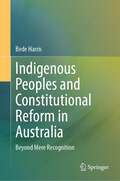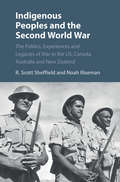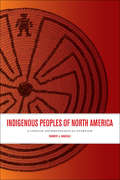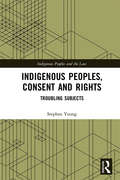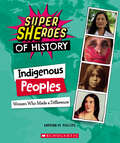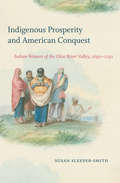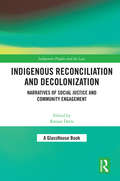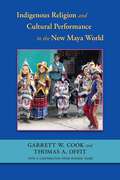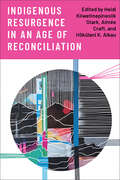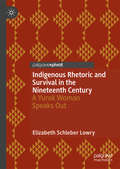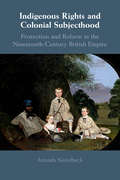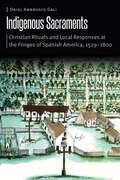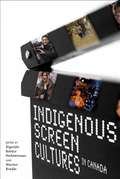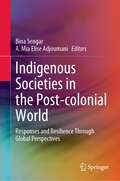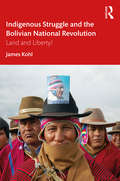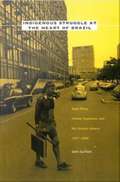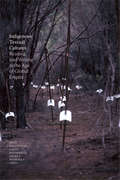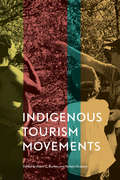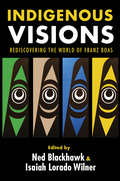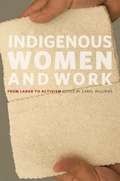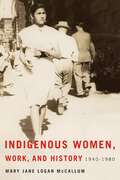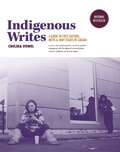- Table View
- List View
Indigenous Peoples and Constitutional Reform in Australia: Beyond Mere Recognition
by Bede HarrisThis book examines whether Australia’s constitution should be reformed so as to enable the country to fulfil its obligations under the United Nations Declaration on the Rights of Indigenous Peoples, which it ratified in 2009. The book surveys the history of the constitutional status of Australia’s Indigenous peoples from the time of colonisation through to the current debate on ‘Indigenous constitutional recognition’. However, it argues that the term ‘Indigenous constitutional recognition', implying that mere acknowledgement of the existence of Indigenous peoples is sufficient to meet their legitimate expectations, misrepresents the nature of the project the country needs to engage in. The book argues that Australia should instead embark upon a reform programme directed towards substantive, and not merely symbolic, constitutional change. It argues that only by the inclusion in the constitution of enforceable constitutional rights can the power imbalance between Indigenous Australians and the rest of society be addressed. Taking a comparative approach and drawing upon the experience of other jurisdictions, the book proposes a comprehensive constitutional reform programme, and includes the text of constitutional amendments designed to achieve the realisation of the rights of Australia’s Indigenous peoples. It ends with a call to improve the standard of civics education so as to overcome voter apprehension towards constitutional change.
Indigenous Peoples and the Second World War: The Politics, Experiences and Legacies of War in the US, Canada, Australia and New Zealand
by R. Scott Sheffield Noah RisemanDuring the Second World War, Indigenous people in the United States, Australia, New Zealand and Canada mobilised en masse to support the war effort, despite withstanding centuries of colonialism. Their roles ranged from ordinary soldiers fighting on distant shores, to soldiers capturing Japanese prisoners on their own territory, to women working in munitions plants on the home front. R. Scott Sheffield and Noah Riseman examine Indigenous experiences of the Second World War across these four settler societies. Informed by theories of settler colonialism, martial race theory and military sociology, they show how Indigenous people and their communities both shaped and were shaped by the Second World War. Particular attention is paid to the policies in place before, during and after the war, highlighting the ways that Indigenous people negotiated their own roles within the war effort at home and abroad.
Indigenous Peoples of North America: A Concise Anthropological Overview
by Robert J. MuckleMost books dealing with North American Indigenous peoples are exhaustive in coverage. They provide in-depth discussion of various culture areas which, while valuable, sometimes means that the big picture context is lost. This book offers a corrective to that trend by providing a concise, thematic overview of the key issues facing Indigenous peoples in North America, from prehistory to the present. It integrates a culture area analysis within a thematic approach, covering archaeology, traditional lifeways, the colonial era, and contemporary Indigenous culture. Muckle also explores the history of the relationship between Indigenous peoples and anthropologists with rigor and honesty. The result is a remarkably comprehensive book that provides a strong grounding for understanding Indigenous cultures in North America.
Indigenous Peoples of the British Dominions and the First World War
by Timothy C. WinegardThis pioneering comparative history of the participation of indigenous peoples of the British Empire in the First World War is based upon archival research in four continents. It provides the first comprehensive examination and comparison of how indigenous peoples of Canada, Australia, Newfoundland, New Zealand and South Africa experienced the Great War. The participation of indigenes was an extension of their ongoing effort to shape and alter their social and political realities, their resistance to cultural assimilation or segregation and their desire to attain equality through service and sacrifice. While the dominions discouraged indigenous participation at the outbreak of war, by late 1915 the imperial government demanded their inclusion to meet the pragmatic need for military manpower. Indigenous peoples responded with patriotism and enthusiasm both on the battlefield and the home front and shared equally in the horrors and burdens of the First World War.
Indigenous Peoples, Consent and Rights: Troubling Subjects (Indigenous Peoples and the Law)
by Stephen YoungAnalysing how Indigenous Peoples come to be identifiable as bearers of human rights, this book considers how individuals and communities claim the right of free, prior and informed consent (FPIC) as Indigenous peoples. The basic notion of FPIC is that states should seek Indigenous peoples’ consent before taking actions that will have an impact on them, their territories or their livelihoods. FPIC is an important development for Indigenous peoples, their advocates and supporters because one might assume that, where states recognize it, Indigenous peoples will have the ability to control how non-Indigenous laws and actions will affect them. But who exactly are the Indigenous peoples that are the subjects of this discourse? This book argues that the subject status of Indigenous peoples emerged out of international law in the late 1970s and early 1980s. Then, through a series of case studies, it considers how self-identifying Indigenous peoples, scholars, UN institutions and non-government organizations (NGOs) dispersed that subject-status and associated rights discourse through international and national legal contexts. It shows that those who claim international human rights as Indigenous peoples performatively become identifiable subjects of international law – but further demonstrates that this does not, however, provide them with control over, or emancipation from, a state-based legal system. Maintaining that the discourse on Indigenous peoples and international law itself needs to be theoretically and critically re-appraised, this book problematises the subject-status of those who claim Indigenous peoples’ rights and the role of scholars, institutions, NGOs and others in producing that subject-status. Squarely addressing the limitations of international human rights law, it nevertheless goes on to provide a conceptual framework for rethinking the promise and power of Indigenous peoples’ rights. Original and sophisticated, the book will appeal to scholars, activists and lawyers involved with indigenous rights, as well as those with more general interests in the operation of international law.
Indigenous Peoples: Women Who Made a Difference (Super SHEroes of History)
by Katrina M. PhillipsMeet the Super SHEroes of History, the women who have shaped history and society since ancient times.Indigenous women were prominent members of their communities long before Europeans reached North America. When the newcomers arrived, they played a key role in holding their communities together in the face of social turmoil. Some joined male warriors to fight European settlement, while others such as Nanyehi/Nancy Ward argued that the two peoples could coexist peacefully. Indigenous women led political and legal fights to preserve their traditional rights throughout the 20th century and still do so today. Some became active campaigners in numerous causes, especially in the struggle to protect sacred lands from construction. This book tells their stories and describes their vital contributions.ABOUT THIS SERIES: From leading warriors into battle in Tang China to fighting for Civil Rights, exploring the deserts of Asia, and standing up for Indigenous peoples around the world, women have shaped history and society since ancient times. Often, however, their achievements went unrecognized. With lively text, compelling photography, and art, Super SHEroes of History brings herstory to life, illuminating the achievements of remarkable women from all backgrounds and all periods of time. The aim of this four-book series is to bring their inspiring stories to young readers— and to use engaging interactive prompts and questions to persuade them that anyone can grow up to change the world!
Indigenous Prosperity and American Conquest: Indian Women of the Ohio River Valley, 1690-1792 (Published by the Omohundro Institute of Early American History and Culture and the University of North Carolina Press)
by Susan Sleeper-SmithIndigenous Prosperity and American Conquest recovers the agrarian village world Indian women created in the lush lands of the Ohio Valley. Algonquian-speaking Indians living in a crescent of towns along the Wabash tributary of the Ohio were able to evade and survive the Iroquois onslaught of the seventeenth century, to absorb French traders and Indigenous refugees, to export peltry, and to harvest riparian, wetland, and terrestrial resources of every description and breathtaking richness. These prosperous Native communities frustrated French and British imperial designs, controlled the Ohio Valley, and confederated when faced with the challenge of American invasion.By the late eighteenth century, Montreal silversmiths were sending their best work to Wabash Indian villages, Ohio Indian women were setting the fashions for Indigenous clothing, and European visitors were marveling at the sturdy homes and generous hospitality of trading entrepots such as Miamitown. Confederacy, agrarian abundance, and nascent urbanity were, however, both too much and not enough. Kentucky settlers and American leaders—like George Washington and Henry Knox—coveted Indian lands and targeted the Indian women who worked them. Americans took women and children hostage to coerce male warriors to come to the treaty table to cede their homelands. Appalachian squatters, aspiring land barons, and ambitious generals invaded this settled agrarian world, burned crops, looted towns, and erased evidence of Ohio Indian achievement. This book restores the Ohio River valley as Native space.
Indigenous Reconciliation and Decolonization: Narratives of Social Justice and Community Engagement (Indigenous Peoples and the Law)
by Ranjan DattaThis book addresses the ethical and practical issues at stake in the reconciliation of Indigenous and non-indigenous communities. An increasing number of researchers, educators, and social and environmental activists are eager to find ways to effectively support ongoing attempts to recognize, integrate and promote Indigenous perspectives and communities. Taking Canada as its focus, this book offers a multidisciplinary consideration of a range of reconciliation policies, practices and initiatives that are relevant in all settler states. Set against its increasing neoliberal appropriation, the book resituates reconciliation in the everyday contexts of community interaction and engagement, as well as in the important areas of Indigenous knowledge, resource management and social and environmental justice. Reconciliation is not just the responsibility of law and government. And, attuned to the different perspectives of settlers, migrants and refugee communities, the book examines areas of opportunity, as well as obstacles to progress, in the forging of a truly decolonizing framework for reconciliation. As the challenges of reconciliation cross numerous academic and substantial areas, this book will appeal to a range of scholars and practitioners working in law, politics, education, environmental studies, anthropology and Indigenous studies.
Indigenous Religion and Cultural Performance in the New Maya World
by Thomas A. Offit Garrett W. CookBased on more than thirty years of ethnographic fieldwork in Highland Guatemala, this study of Maya diviners, shamans, ritual dancers, and religious brotherhoods describes the radical changes in traditional Maya religious practice wrought by economic globalization and political turmoil. Focusing on the primary participants in the annual festival in the K&’iche&’ Maya village of Santiago Momostenango, the authors show how older religious traditionalists and the new generation of &“cultural activist&” religious practitioners interact within a single local community, and how their competing agendas for adapting Maya religiosity to a new and continually changing political economy are perpetuating and changing Maya religious traditions.
Indigenous Resurgence in an Age of Reconciliation
by Aimée Craft Heidi Kiiwetinepinesiik HŌkūlani K. AikauWhat would Indigenous resurgence look like if the parameters were not set with a focus on the state, settlers, or an achievement of reconciliation? Indigenous Resurgence in an Age of Reconciliation explores the central concerns and challenges facing Indigenous nations in their resurgence efforts, while also mapping the gaps and limitations of both reconciliation and resurgence frameworks. The essays in this collection centre the work of Indigenous communities, knowledge, and strategies for resurgence and, where appropriate, reconciliation. The book challenges narrow interpretations of indigeneity and resurgence, asking readers to take up a critical analysis of how settler colonial and heteronormative framings have infiltrated our own ways of relating to our selves, one another, and to place. The authors seek to (re)claim Indigenous relationships to the political and offer critical self-reflection to ensure Indigenous resurgence efforts do not reproduce the very conditions and contexts from which liberation is sought. Illuminating the interconnectivity between and across life in all its forms, this important collection calls on readers to think expansively and critically about Indigenous resurgence in an age of reconciliation.
Indigenous Rhetoric and Survival in the Nineteenth Century: A Yurok Woman Speaks Out
by Elizabeth Schleber LowryIn 1916, Lucy Thompson, an indigenous woman from Northwestern California, published To the American Indian: Reminiscences of a Yurok Woman. The first book to be published by a member of the California Yurok tribe, it offers an autobiographical view of the intricacies of life in the tribe at the dawn of the twentieth century, as well as a powerful critique of the colonial agenda. Elizabeth Schleber Lowry presents a rhetorical analysis of this iconic text, investigating how Thompson aimed to appeal to diverse audiences and constructed arguments that still resonate today. Placing Thompson’s work in the context of nineteenth-century Native American rhetoric, Lowry argues that Thompson is a skillful rhetor who has much to teach us about our nation’s violent past and how it continues to shape our culture and politics. In To the American Indian, Thompson challenges negative stereotypes about indigenous cultures and contrasts widespread Euroamerican abuse of natural resources with Yurok practices that once effectively maintained the region’s ecological and social stability. As such, Thompson’s text functions not only as a memoir, but also as a guide to sustainable living.
Indigenous Rights and Colonial Subjecthood: Protection and Reform in the Nineteenth-Century British Empire
by Amanda NettelbeckAmanda Nettelbeck explores how policies designed to protect the civil rights of indigenous peoples across the British Empire were entwined with reforming them as governable colonial subjects. The nineteenth-century policy of 'Aboriginal protection' has usually been seen as a fleeting initiative of imperial humanitarianism, yet it sat within a larger set of legally empowered policies for regulating new or newly-mobile colonised peoples. Protection policies drew colonised peoples within the embrace of the law, managed colonial labour needs, and set conditions on mobility. Within this comparative frame, Nettelbeck traces how the imperative to protect indigenous rights represented more than an obligation to mitigate the impacts of colonialism and dispossession. It carried a far-reaching agenda of legal reform that arose from the need to manage colonised peoples in an Empire where the demands of humane governance jostled with colonial growth.
Indigenous Sacraments: Christian Rituals and Local Responses at the Fringes of Spanish America, 1529–1800 (Borderlands and Transcultural Studies)
by Oriol Ambrogio GaliIndigenous Sacraments provides the first study of Indigenous perceptions of the Christian sacraments at the fringes of colonial Spanish America, particularly in the missions established by the Jesuits in northwestern Mexico, central southern Chile, and the Gran Chaco. After Jesuit missionaries arrived in these regions between the end of the sixteenth and the early seventeenth centuries, their sacraments came to control every rite of passage, from birth to reaching adulthood to the formation of new families to death. Through the administration of the sacraments, missionaries intended to replace extant Indigenous habits and beliefs with Christian values. The disruptions triggered by such processes raised multiple local reactions, from initial curiosity and incomprehension to rejection, partial acceptance, and ritual imitation. Locals debated the newly introduced rituals and both violently rejected them and developed their own versions, becoming active participants in the sacraments&’ diffusion. Oriol Ambrogio Gali draws on a range of diverse sources to explore the changing attitudes toward the sacraments and to highlight the cultural and religious evolution of the Indigenous groups living at the fringes of Spanish America. By exploring local perceptions of the Christian sacraments, Ambrogio Gali shows that Indigenous peoples were far from static recipients of Christianity in the Americas.
Indigenous Screen Cultures in Canada
by Sigurjón Baldur Hafsteinsson Marian BredinIndigenous media challenges the power of the state, erodes communication monopolies, and illuminates government threats to indigenous cultural, social, economic, and political sovereignty. Its effectiveness in these areas, however, is hampered by government control of broadcast frequencies, licensing, and legal limitations over content and ownership.Indigenous Screen Cultures in Canada explores key questions surrounding the power and suppression of indigenous narrative and representation in contemporary indigenous media. Focussing primarily on the Aboriginal Peoples Television Network, the authors also examine indigenous language broadcasting in radio, television, and film; Aboriginal journalism practices; audience creation within and beyond indigenous communities; the roles of program scheduling and content acquisition policies in the decolonization process; the roles of digital video technologies and co-production agreements in indigenous filmmaking; and the emergence of Aboriginal cyber-communities.
Indigenous Societies in the Post-colonial World: Responses and Resilience Through Global Perspectives
by Bina Sengar A. Mia Elise AdjoumaniThis edited book provides perceptions on “indigeneity” through a global perspective. Emphasizing the contemporary and postcolonial debates on indigenous, it delves into diversity and dissonance within indigenous concepts. Through its chapters based on theoretical and empirical studies from Asian, African, and American perceptions of indigenous societies, it brings out complexity, resilience, and response of “indigenous” in the post-colonial global society. It especially looks at how these societies manage to move forward by going beyond the stigma of the colonial past. The chapters in the book are divided into three sections where they discuss indigenous cultures through interdisciplinary perspectives. The narrative approach of historical concepts and contemporary indigenous challenges within the book include anthropological, cultural, ecological, historical, literary, and legal studies. The contributions in the collection come from widely respected international scholars who are engaged in indigeneity and postcolonial questions. It allows the reader to (re)discover the theories and resilience of the indigenous societies that are historically marked and are reshaping the histories and contemporary narratives in the world. This book is of particular interest to scholars, students, policymakers, and people curious about the histories and the dynamic progress of the indigenous and indigenous societies of Africa, the Americas, and Asia.
Indigenous Struggle and the Bolivian National Revolution: Land and Liberty!
by James KohlIndigenous Struggle and the Bolivian National Revolution: Land and Liberty! reinterprets the genesis and contours of the Bolivian National Revolution from an indigenous perspective. In a critical revision of conventional works, the author reappraises and reconfigures the tortuous history of insurrection and revolution, counterrevolution and resurrection, and overthrow and aftermath in Bolivia. Underlying the history of creole conflict between dictatorship and democracy lies another conflict – the unrelenting 500-year struggle of the conquered indigenous peoples to reclaim usurped lands, resist white supremacist dominion, and seize autonomous political agency. The book utilizes a wide array of sources, including interviews and documents to illuminate the thoughts, beliefs, and objectives of an extraordinary cast of indigenous revolutionaries, giving readers a firsthand look at the struggles of the subaltern majority against creole elites and Anglo-American hegemons in South America’s most impoverished nation. This book will be of interest to students and scholars of modern Latin American history, peasant movements, the history of U.S. foreign relations, revolutions, counterrevolutions, and revolutionary warfare.
Indigenous Struggle at the Heart of Brazil: State Policy, Frontier Expansion, and the Xavante Indians, 1937–1988
by Seth GarfieldIndigenous Struggle at the Heart of Brazil examines the dynamic interplay between the Brazilian government and the Xavante Indians of central Brazil in the context of twentieth-century western frontier expansion and the state's indigenous policy. Offering a window onto Brazilian developmental policy in Amazonia and the subsequent process of indigenous political mobilization, Seth Garfield bridges historical and anthropological approaches to reconsider state formation and ethnic identity in twentieth-century Brazil. Garfield explains how state officials, eager to promote capital accumulation, social harmony, and national security on the western front, sought to delimit indigenous reserves and assimilate native peoples. Yet he also shows that state efforts to celebrate Indians as primordial Brazilians and nationalist icons simultaneously served to underscore and redefine ethnic difference. Garfield explores how various other social actors--elites, missionaries, military officials, intellectuals, international critics, and the Indians themselves--strove to remold this multifaceted project. Paying particular attention to the Xavante's methods of engaging state power after experience with exile, territorial loss, and violence in the "white" world, Garfield describes how they emerged under military rule not as the patriotic Brazilians heralded by state propagandists but as a highly politicized ethnic group clamoring for its constitutional land rights and social entitlements.Indigenous Struggle at the Heart of Brazil will interest not only historians and anthropologists but also those studying nationbuilding, Brazil, Latin America, comparative frontiers, race, and ethnicity.
Indigenous Textual Cultures: Reading and Writing in the Age of Global Empire
by Tony Ballantyne, Lachy Paterson & Angela WanhallaAs modern European empires expanded, written language was critical to articulations of imperial authority and justifications of conquest. For imperial administrators and thinkers, the non-literacy of “native” societies demonstrated their primitiveness and inability to change. Yet as the contributors to Indigenous Textual Cultures make clear through cases from the Pacific Islands, Australasia, North America, and Africa, indigenous communities were highly adaptive and created novel, dynamic literary practices that preserved indigenous knowledge traditions. The contributors illustrate how modern literacy operated alongside orality rather than replacing it. Reconstructing multiple traditions of indigenous literacy and textual production, the contributors focus attention on the often hidden, forgotten, neglected, and marginalized cultural innovators who read, wrote, and used texts in endlessly creative ways. This volume demonstrates how the work of these innovators played pivotal roles in reimagining indigenous epistemologies, challenging colonial domination, and envisioning radical new futures.Contributors. Noelani Arista, Tony Ballantyne, Alban Bensa, Keith Thor Carlson, Evelyn Ellerman, Isabel Hofmeyr, Emma Hunter, Arini Loader, Adrian Muckle, Lachy Paterson, Laura Rademaker, Michael P. J. Reilly, Bruno Saura, Ivy T. Schweitzer, Angela Wanhalla
Indigenous Tourism Movements
by Alexis Celeste Bunten Nelson H.H. GraburnCultural tourism is frequently marketed as an economic panacea for communities whose traditional ways of life have been compromised by the dominant societies by which they have been colonized. Indigenous communities in particular are responding to these opportunities in innovative ways that set them apart from their non-Indigenous predecessors and competitors. Indigenous Tourism Movements explores Indigenous identity using “movement” as a metaphor, drawing on case studies from throughout the world including Botswana, Canada, Chile, Panama, Tanzania, and the United States. Editors Alexis C.Bunten and Nelson Graburn, along with a diverse group of contributors, frame tourism as a critical lens to explore the shifting identity politics of Indigeneity in relation to heritage, global policy, and development. They juxtapose diverse expressions of identity – from the commodification of Indigenous culture to the performance of heritage for tourists – to illuminate the complex local, national, and transnational connections these expressions produce. Indigenous Tourism Movements is a sophisticated, sensitive, and refreshingly frank examination of Indigeneity in the contemporary world.
Indigenous Visions: Rediscovering the World of Franz Boas (The Henry Roe Cloud Series on American Indians and Modernity)
by Ned Blackhawk Isaiah Lorado WilnerA compelling study that charts the influence of Indigenous thinkers on Franz Boas, the founder of modern anthropology In 1911, the publication of Franz Boas’s The Mind of Primitive Man challenged widely held claims about race and intelligence that justified violence and inequality. Now, a group of leading scholars examines how this groundbreaking work hinged on relationships with a global circle of Indigenous thinkers who used Boasian anthropology as a medium for their ideas. Contributors also examine how Boasian thought intersected with the work of major modernist figures, demonstrating how ideas of diversity and identity sprang from colonization and empire.
Indigenous Women and Work: From Labor to Activism
by Carol WilliamsThe essays in Indigenous Women and Work create a transnational and comparative dialogue on the history of the productive and reproductive lives and circumstances of Indigenous women from the late nineteenth century to the present in the United States, Australia, New Zealand/Aotearoa, and Canada. Surveying the spectrum of Indigenous women's lives and circumstances as workers, both waged and unwaged, the contributors offer varied perspectives on the ways women's work has contributed to the survival of communities in the face of ongoing tensions between assimilation and colonization. They also interpret how individual nations have conceived of Indigenous women as workers and, in turn, convert these assumptions and definitions into policy and practice. The essays address the intersection of Indigenous, women's, and labor history, but will also be useful to contemporary policy makers, tribal activists, and Native American women's advocacy associations. Contributors are Tracey Banivanua Mar, Marlene Brant Castellano, Cathleen D. Cahill, Brenda J. Child, Sherry Farrell Racette, Chris Friday, Aroha Harris, Faye HeavyShield, Heather A. Howard, Margaret D. Jacobs, Alice Littlefield, Cybèle Locke, Mary Jane Logan McCallum, Kathy M'Closkey, Colleen O'Neill, Beth H. Piatote, Susan Roy, Lynette Russell, Joan Sangster, Ruth Taylor, and Carol Williams.
Indigenous Women, Work, and History: 1940-1980
by Mary Jane MccallumWhen dealing with Indigenous women’s history we are conditioned to think about women as private-sphere figures, circumscribed by the home, the reserve, and the community. Moreover, in many ways Indigenous men and women have been cast in static, pre-modern, and one-dimensional identities, and their twentieth century experiences reduced to a singular story of decline and loss. In Indigenous Women, Work, and History, historian Mary Jane Logan McCallum rejects both of these long-standing conventions by presenting case studies of Indigenous domestic servants, hairdressers, community health representatives, and nurses working in “modern Native ways” between 1940 and 1980. Based on a range of sources, including the records of the Departments of Indian Affairs and National Health and Welfare, interviews, and print and audio-visual media, McCallum shows how state-run education and placement programs were part of Canada’s larger vision of assimilation and extinguishment of treaty obligations. Conversely, she also shows how Indigenous women link these same programs to their social and cultural responsibilities of community building and state resistance. By placing the history of these modern workers within a broader historical context of Aboriginal education and health, federal labour programs, post-war Aboriginal economic and political developments, and Aboriginal professional organizations, McCallum challenges us to think about Indigenous women’s history in entirely new ways.
Indigenous Writes: A Guide to First Nations, Métis, & Inuit Issues in Canada
by Chelsea VowelDelgamuukw. Sixties Scoop. Bill C-31. Blood quantum. Appropriation. Two-Spirit. Tsilhqot&’in. Status. TRC. RCAP. FNPOA. Pass and permit. Numbered Treaties. Terra nullius. The Great Peace… Are you familiar with the terms listed above? In Indigenous Writes, Chelsea Vowel, legal scholar, teacher, and intellectual, opens an important dialogue about these (and more) concepts and the wider social beliefs associated with the relationship between Indigenous Peoples and Canada. In 31 essays, Chelsea explores the Indigenous experience from the time of contact to the present, through five categories—Terminology of Relationships; Culture and Identity; Myth-Busting; State Violence; and Land, Learning, Law, and Treaties. She answers the questions that many people have on these topics to spark further conversations at home, in the classroom, and in the larger community. Indigenous Writes is one title in The Debwe Series.
Indigenous Writes: A Guide to First Nations, Métis, & Inuit Issues in Canada
by Chelsea VowelDelgamuukw. Sixties Scoop. Bill C-31. Blood quantum. Appropriation. Two-Spirit. Tsilhqot&’in. Status. TRC. RCAP. FNPOA. Pass and permit. Numbered Treaties. Terra nullius. The Great Peace… Are you familiar with the terms listed above? In Indigenous Writes, Chelsea Vowel, legal scholar, teacher, and intellectual, opens an important dialogue about these (and more) concepts and the wider social beliefs associated with the relationship between Indigenous Peoples and Canada. In 31 essays, Chelsea explores the Indigenous experience from the time of contact to the present, through five categories—Terminology of Relationships; Culture and Identity; Myth-Busting; State Violence; and Land, Learning, Law, and Treaties. She answers the questions that many people have on these topics to spark further conversations at home, in the classroom, and in the larger community. Indigenous Writes is one title in The Debwe Series.
Indigenous Writes: A Guide to First Nations, Métis, & Inuit Issues in Canada
by Chelsea VowelDelgamuukw. Sixties Scoop. Bill C-31. Blood quantum. Appropriation. Two-Spirit. Tsilhqot’in. Status. TRC. RCAP. FNPOA. Pass and permit. Numbered Treaties. Terra nullius. The Great Peace… Are you familiar with the terms listed above? In Indigenous Writes, Chelsea Vowel, legal scholar, teacher, and intellectual, opens an important dialogue about these (and more) concepts and the wider social beliefs associated with the relationship between Indigenous Peoples and Canada. In 31 essays, Chelsea explores the Indigenous experience from the time of contact to the present, through five categories—Terminology of Relationships; Culture and Identity; Myth-Busting; State Violence; and Land, Learning, Law, and Treaties. She answers the questions that many people have on these topics to spark further conversations at home, in the classroom, and in the larger community. Indigenous Writes is one title in The Debwe Series.
